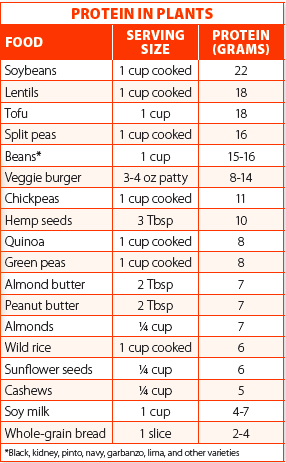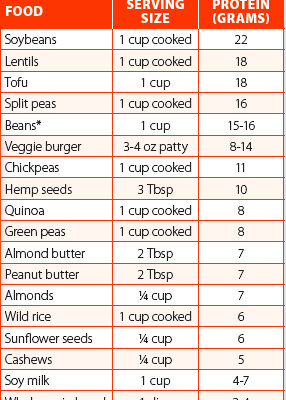High-Quality Protein Is Essential In a Plant-Based Diet
Nutrition experts advise adopting a plant-based dietary pattern due to the many health benefits associated with eating this way. But you may wonder if you can get enough protein if you’re eating less meat. The answer is a resounding, “Yes”—by adding more protein from plant sources, including beans, nuts, soy, and whole grains.
Getting plenty of protein is key to maintaining muscle mass and fighting frailty as you get older. The Recommended Daily Allowance (RDA) for protein is 46 grams for all women, but many nutrition experts advise adjusting that number according to your weight—0.36 grams of protein per pound for most people. (That’s about 50 grams for a 120-pound person and 58 grams for a 160-pound person.)
An added bonus of plant-based protein picks is that they deliver dietary fiber and phytonutrients that animal foods lack.
Protein Is Essential
A significant amount of protein is included in every healthy dietary pattern, and the 2020-2025 Dietary Guidelines for Americans advise getting anywhere from 10 to 35 percent of your daily calories from foods that contain protein. Protein is needed for more than muscle health: You need it for your tendons and cartilage, skin, hair, and nails, and hormones, enzymes, and antibodies. Studies have associated protein intake with lower body mass index (BMI) and waist circumference, perhaps because it promotes satiety. One study linked greater protein consumption with a reduced risk of stroke.

Quality Counts
When scientists talk about “complete” protein, they mean a food that delivers enough of all nine essential amino acids that your body can’t make itself. Only a few plant foods provide complete protein—notably, soy, quinoa, and buckwheat. It is now known that you don’t have to get all nine essential amino acids in the same meal (such as by combining beans and rice). Just make sure you eat a variety of plant-based proteins throughout the day. Start with breakfast, since studies have shown that spreading out your protein intake throughout the day rather than having a protein-heavy dinner helps your body use it more effectively.
Protein-Rich Plants
To hit your daily protein target while eating more plant foods and fewer animal foods, include these protein-rich choices:
- Beans. Pick whichever beans you prefer; all of them are good protein sources. Don’t forget about chickpeas (garbanzo beans) and lima beans (butter beans). If you use canned beans, choose reduced-sodium or nosalt- added products.
- Soybeans and soy products. Soybeans, which are also legumes, are gaining popularity in the U.S.; in many grocery stores, you can find roasted soybeans (soy nuts), soymilk, and green soybeans (edamame), along with premade foods, such as veggie burgers, sausages, and non-dairy cheeses. Tofu is made from soybean curds, while tempeh is a fermented soybean product.
- Other legumes. Lentils are among the most concentrated sources of unprocessed, plant-based protein. The legumes we call “peas” vary in protein content, with more in split peas and less in green peas and black-eyed peas.
- Nuts and seeds. Nuts and seeds and “butters” made from them are packed with protein but also high in calories, so consume them in moderation. For example, along with the 7 to 8 grams of protein in a quarter-cup of almonds or two tablespoons of peanut butter, you’ll get about 200 calories.
- Whole grains. Quinoa is the standout, with 8 grams of protein in a one-cup serving. Other whole grains that provide protein include wild rice, buckwheat, amaranth, barley, and oats.
Clearly, there are plenty of plant-based protein foods from which to choose, so it’s easy to get the protein your body needs, even when you’ve cut back on meat and other animal-sourced foods.
The post High-Quality Protein Is Essential In a Plant-Based Diet appeared first on University Health News.
Read Original Article: High-Quality Protein Is Essential In a Plant-Based Diet »


